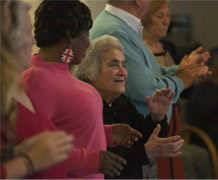
Participants reported that singing and music making with others helped them develop a sense of group belonging.
Working with music groups to improve recovery for people with aphasia
A team of health researchers from the University of Exeter Medical School and the National Institute for Health Research are working with local music charity Plymouth Music Zone to bring together people who have communication problems caused by aphasia.
Aphasia is a speech and language disorder, which is caused by damage to the brain, often as a result of having a stroke. People with aphasia can struggle to speak or to understand spoken language, but also can have difficulties with reading, writing or using numbers.
Of the over 150,000 people who have a stroke each year, around a third (33%) will also experience aphasia. Beyond the impairment to speech and language, people with aphasia report a range of psychological and social problems, which negatively affect wellbeing, including reduced confidence and social isolation. It is these issues which are often inadequately dealt with by healthcare services.
A research team, based at PenCLAHRC, has sought to tackle these issues by trialling a new group-based music intervention for people with aphasia. The team worked with Plymouth Music Zone (PMZ), people with aphasia following stroke, and clinicians, to design a programme that involved a group singing session. This session, run by Plymouth Music Zone, used songs from a specially prepared song book to musical accompaniment.
Participants in the session reported that singing and music making with others helped them develop a sense of group belonging, and felt that, if the singing sessions continued, participation in them would help improve their wellbeing.
Debbie Geraghty, Executive Director at Plymouth Music Zone said: "It's really exciting to be able to make the most of PMZ's experience in using the transforming power of music to help people deal with their health challenges. We work with a wide range of people and having researchers interested in this work gives us more opportunities to share our learning and practice to help people with aphasia. We're delighted that our work is now opening doors to researchers like those from PenCLAHRC to inform the wide public arena.”
The findings of this research suggest that engagement with health therapies may be enhanced in group settings when participants establish meaningful psychological connections with other group members. Further research is now needed, however, to trial this group-based music programme more extensively, on larger groups over a longer period, to fully explore the benefits that can be gained for people with aphasia.
Project lead, Dr Mark Tarrant, of the University of Exeter Medical School, said: “What this new research shows is that whether or not people in treatment groups form psychological connections with each other may be crucially important to their engagement with the group programme – in this case group singing. We believe that when such connections are made, the health benefits of group programmes may be maximised.”
To find out more about the project visit the project webpage
You can also read a research paper written by the project team, here.
Date: 27 April 2016
